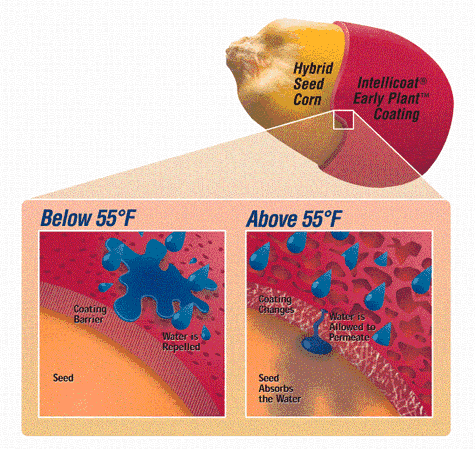|
Click
here for Printable Version
Woodbine, Iowa, farmer Vernon Smith, or Avon, Illinois, farmer Kent
Lock, or Omro, Wisconsin, farmer Dan Stokes weren't alone in their
quest to plant corn earlier last spring. For many corn growers,
one of the most difficult decisions to make is when to begin planting.
If you plant too early, the crop may not pull through harsh early
spring conditions. If you wait, you may not get all your acres planted
on time and suffer yield loss, by as much as 20%, from late planting.
 |
Smith
says a new "intelligent" seed coating with a built-in
temperature switch set to keep moisture out before soil temperatures
reach 55 degrees F. and let moisture in after that helped
make the decision easier. He planted hybrid corn with "Intellicoat"
and says he'll plant more acres this spring. While Smith planted
Fielder's Choice Direct hybrid corn, "Intellicoat"
is now also available on Beck's Hybrids, and Hubner Seed Co.
brands. Several other hybrid corn companies are testing Intellicoat
and it may be added to more brands by spring planting 2004. |
Should you wait to plant?
Corn growers know, during the planting season, every
minute counts. Most years the window of time when weather and soil
conditions are right for corn planting is typically very short –
usually 7-10 days.
Lock says, “If you wait for
your optimum planting date, you may not get all your acres planted
before your yield potential starts to drop.”
|
Omro, Wisconsin, farmer Dan Stokes likes being able
to plant earlier with confidence that the corn seed is protected
from moisture and trying to germinate in soil that’s
not warm enough by the “Intellicoat” polymer.
|
Should you plant early?
Growers have historically
tried the risky practice of planting uncoated seed in cold
early spring soils in order to get a jump on the corn planting
season. Having corn in the ground early can help avoid the
yield loss associated being shut out and forced to plant later
in the season. Farmers have long recognized that earlier planting
can help to create additional days for the crop to reach maturity
and dry down. However, there is potential yield loss related
to planting uncoated seed early.
When a seed germinates in cold soils it is
vulnerable to chilling injury, which impairs its development
and may kill it, thus reducing stand counts.
|
A solution to the dilemma
Stokes says, “Being able to plant early, knowing
the seed was coated and protected until the soil warmed up is what
gave me the confidence to try it.”
“Farmers looking to plant
in colder, earlier season conditions, even in no-till applications,
can drastically reduce their risk and maximize their profit-potential
with Intellicoat Early Plant coated seeds,” says Landec Ag,
Inc. senior agronomist Claude Butt. “ Compared to uncoated
seeds planted early, Intellicoat coated seeds have produced more
uniform emergence, higher stand counts and higher yields in hundreds
of on-farm field trials on more than 16,000 acres in the past two
years.”
“Comparing Intellicoat coated seeds to uncoated
seeds in these early-planted trials, the Intellicoat coated seeds
have consistently shown better, more uniform emergence and higher
stand counts for maximum yield potential, even in no-till.”
 |
Woodbine,
Iowa, farmer Vernon Smith successfully used “Intellicoat”
coated hybrid corn last spring that allows for planting up to
four weeks earlier than normal. “It was on Fielder’s
Choice hybrid corn and was one of our best yielding fields.
We’ll use it again this spring,” Smith says. |
Butt adds, “The new Intellicoat
Early Plant seed corn coatings actually control germination in cold,
early spring soils to protect the seeds and help ensure they germinate
only under optimum conditions. The result is a more timely, uniform
emergence – even in no-till applications.
Now, when your field is ready for planting, whether
it be a few days or even as many as four weeks sooner than the normal
planting date, you can take full advantage with minimal risk of
stand loss.
Butt says, "The bottom line is that Intellicoat
technology lets you reliably expand your planting window to avoid
late planting and maximize your yield potential. It also lets you
spread your work load and finish planting your corn early so you
can get a jump on your soybeans. Finally, growers report reduced
drying costs at harvest."
 |
Avon, Illinois
corn grower Kent Lock has more free time to spend with
family as a result of using Intellicoat corn hybrids allowing
earlier planting which also results in higher yields. |
To find out more about Intellicoat
Early Plant technology the seed brands, and hybrids that it will
be featured on in the 2003 growing season, call toll-free 1-800-241-7252.
Ask for a free Intellicoat Early Plant information kit that includes
a technical brochure, a complete report on the Intellicoat research
trials conducted in 2001, and a reference guide to help growers
optimize the use of Early Plant hybrids.
Or, click here and
view that info in a PDF format.
Click
here for Printable Version
|



